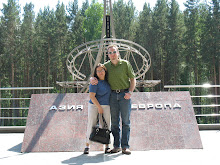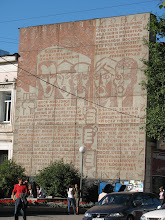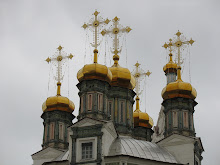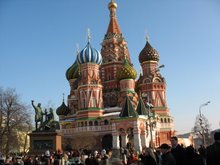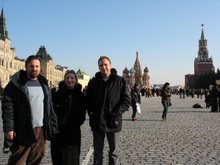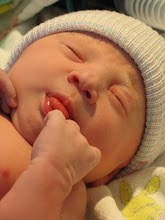I love summers! Summers in Seattle are magical and probably one of my favorite things in the entire world. This summer was one of reunions with old friends, General Assembly craziness, and an amazing week in Seattle.
Here's the first installment of my pictures. I landed in Chicago on July 10 after a long delay in Atlanta. The flight from Moscow was fine--10 hours of chatting on and off in Russian with a grandmother who was visiting her daughter in Indianapolis. If I understood the story correctly, her daughter just had a baby two weeks ago and grandma was really excited about the visit. Grandma was an accompanist for a regional orchestra in a town outside of the Moscow Oblast.
Chicago was lovely--green & lush--crashed at Jessica & Laura's (THANK YOU!). Enjoyed a surprise visit with my friend Maddie--Maddie and I played flute together in college. She kept me laughing through the tortures of my Music degree!
Then off to Indy and a two-day road trip to visit Gina in Bryan, TX. (Can anyone tell me why Holiday Inns always smell like dirty socks?) The Honda did fantastically! Lots of fun at Gina's with Clara, Scott & Lillian from High School. Gina is an amazing cook & host and it was such a treat to spend time with friends from High School. I am stunned every time I think that we graduated 14 years ago! Ahhhhhh! The blessing is that I still keep in touch with these folks so many years later.
Then I was off to Slumber Falls Camp where I worked for two summers and directed for 6! The weather was so cool and wet for that time of the year (see river pics). I was amazed at the river level and the daily downpour. It was a great treat to sleep in one of the river cabins and listen to the crickets and river roaring down the hill. Got to see old friends and favorite place in New Braunfels which was a restful treat before General Assembly.
Part II coming soon: General Assembly
Click on the photos below for larger images.
Friday, August 24, 2007
A bad Russia day
Cultural adjustment means there will be good days and bad days. I've been back in Moscow for 2 and a half weeks. This is about the time I usually hit a slump--the realities of life in Moscow hit me, the charm wears off, and no one asks anymore how your trip was.
My friend Anita and I were chatting at lunch about Russian service. When we travel outside of Russia, you are shocked when people are nice to you or the service is good. I took a friend of a friend who had just arrived out to lunch and described the restaurant as pretty good food and the service isn't bad. Translation=that's a good restaurant here in Moscow. My friend Anita remarked it's amazing what we will tolerate and pay good money for in Moscow; lowest common denominator is acceptable and anything above is a welcomed surprise. The thing to remember is that in Russia there just isn't a tradition of customer service; there was no incentive in the previous 100 years for good or friendly service.
The hard part of coming back was that my trip was really fabulous and it's hard to top that! I'll post some pictures in the coming days, but it really did fill my soul to be home, to feel independent, to see mountains and sunshine, and most importantly to be around people who know me and love me.
Safe travels . . . Carolyn
My friend Anita and I were chatting at lunch about Russian service. When we travel outside of Russia, you are shocked when people are nice to you or the service is good. I took a friend of a friend who had just arrived out to lunch and described the restaurant as pretty good food and the service isn't bad. Translation=that's a good restaurant here in Moscow. My friend Anita remarked it's amazing what we will tolerate and pay good money for in Moscow; lowest common denominator is acceptable and anything above is a welcomed surprise. The thing to remember is that in Russia there just isn't a tradition of customer service; there was no incentive in the previous 100 years for good or friendly service.
The hard part of coming back was that my trip was really fabulous and it's hard to top that! I'll post some pictures in the coming days, but it really did fill my soul to be home, to feel independent, to see mountains and sunshine, and most importantly to be around people who know me and love me.
Safe travels . . . Carolyn
Wednesday, August 15, 2007
Patriotic Conceptions: Time off to Procreate
I'm back in Moscow and on the same time clock, finally! I have lots to write about from my trip to the US, but first here's a funny bit from our English language paper.
Wednesday, August 15, 2007. Issue 3721. Page 4.
Region Aims for Patriotic Conceptions
By Liza Kuznetsova
The Associated Press
The Kartuzovs driving away from the hospital in the SUV they won after being chosen from among 78 other couples.
A region best known as the birthplace of Lenin has found a novel way to fight the nation's birthrate crisis: It has declared Sept. 12 the Day of Conception and is giving couples time off from work to procreate.
The hope is for a big brood of babies exactly nine months later on Russia's national day. Couples who "give birth to a patriot" during the June 12 festivities will win money, cars, refrigerators and other prizes.
Ulyanovsk, a region on the Volga River about 900 kilometers east of Moscow, has held similar contests since 2005. Since then, the number of competitors, and the number of babies born to them, has been on the rise.
Alexei Bezrukov and his wife, Yulia, won a 250,000 ruble (about $10,000) cash prize in June after she gave birth to a baby boy, Andrei. Bezrukov said patriotism wasn't their motive for having a child, their third, although the money was welcome.
"It was a patriotic atmosphere, you know when everyone is celebrating, but I wasn't thinking of anything but my son," he said. "The whole thing is great, it's great to get 250,000 rubles when you have a new baby to take care of."
Russia, with one-seventh of the Earth's land surface, has a population of 141.4 million, making it one of the most sparsely settled countries in the world. Due to a low birthrate and very high death rate, the population has been shrinking since the early 1990s.
It is now falling by almost half a percent each year. Demographic experts estimate that Russia's population could fall below 100 million by 2050.
In his state of the nation address last year, President Vladimir Putin called the demographic crisis the most acute problem facing Russia and announced a broad effort to boost the birthrate, including cash incentives to families to have more than one child.
Ulyanovsk Governor Sergei Morozov has added an element of fun to the national campaign.
When he held the first competition in 2005, 311 women signed up to take part -- and qualify for a half-day off from work. In June 2006, 46 more babies were born in Ulyanovsk's 25 hospitals than in June of the previous year, including 28 born on June 12, officials in the governor's office said.
More than 500 women signed up for the second contest, on Sept. 12 in 2006. Exactly nine months later, 78 babies, triple the region's daily average, were born. They were welcomed into the world as the national anthem was played, the officials said.
Since the campaign began, the birthrate in the region has risen steadily and is up 4.5 percent so far this year over the same period in 2006, according to the regional administration's web site.
Everyone who has a baby in an Ulyanovsk hospital on Russia Day gets some kind of prize. But the grand-prize winners are couples judged to be the fittest parents by a committee that deliberates for two weeks over the selection.
The 2007 grand prize went to Irina and Andrei Kartuzov, who received a UAZ-Patriot, an SUV made in Ulyanovsk. They told reporters that they were planning to have another child anyway when they heard about the contest.
Irina Kartuzova had to have a Caesarian section to deliver the baby and it was scheduled for June 12.
The selection committee chose the Kartuzovs from among the 78 couples because of their "respectability" and "commendable parenting" of their two older children, a spokesman for the governor said.
Other contestants won video cameras, televisions, refrigerators and washing machines.
Under the federal program, women who give birth to a second or subsequent child are to receive certificates worth 250,000 rubles, which can be used to pay for education or to improve the family's living conditions.
Monthly support payments were raised this year to 1,500 rubles (about $60) from 700 rubles.
Wednesday, August 15, 2007. Issue 3721. Page 4.
Region Aims for Patriotic Conceptions
By Liza Kuznetsova
The Associated Press
The Kartuzovs driving away from the hospital in the SUV they won after being chosen from among 78 other couples.
A region best known as the birthplace of Lenin has found a novel way to fight the nation's birthrate crisis: It has declared Sept. 12 the Day of Conception and is giving couples time off from work to procreate.
The hope is for a big brood of babies exactly nine months later on Russia's national day. Couples who "give birth to a patriot" during the June 12 festivities will win money, cars, refrigerators and other prizes.
Ulyanovsk, a region on the Volga River about 900 kilometers east of Moscow, has held similar contests since 2005. Since then, the number of competitors, and the number of babies born to them, has been on the rise.
Alexei Bezrukov and his wife, Yulia, won a 250,000 ruble (about $10,000) cash prize in June after she gave birth to a baby boy, Andrei. Bezrukov said patriotism wasn't their motive for having a child, their third, although the money was welcome.
"It was a patriotic atmosphere, you know when everyone is celebrating, but I wasn't thinking of anything but my son," he said. "The whole thing is great, it's great to get 250,000 rubles when you have a new baby to take care of."
Russia, with one-seventh of the Earth's land surface, has a population of 141.4 million, making it one of the most sparsely settled countries in the world. Due to a low birthrate and very high death rate, the population has been shrinking since the early 1990s.
It is now falling by almost half a percent each year. Demographic experts estimate that Russia's population could fall below 100 million by 2050.
In his state of the nation address last year, President Vladimir Putin called the demographic crisis the most acute problem facing Russia and announced a broad effort to boost the birthrate, including cash incentives to families to have more than one child.
Ulyanovsk Governor Sergei Morozov has added an element of fun to the national campaign.
When he held the first competition in 2005, 311 women signed up to take part -- and qualify for a half-day off from work. In June 2006, 46 more babies were born in Ulyanovsk's 25 hospitals than in June of the previous year, including 28 born on June 12, officials in the governor's office said.
More than 500 women signed up for the second contest, on Sept. 12 in 2006. Exactly nine months later, 78 babies, triple the region's daily average, were born. They were welcomed into the world as the national anthem was played, the officials said.
Since the campaign began, the birthrate in the region has risen steadily and is up 4.5 percent so far this year over the same period in 2006, according to the regional administration's web site.
Everyone who has a baby in an Ulyanovsk hospital on Russia Day gets some kind of prize. But the grand-prize winners are couples judged to be the fittest parents by a committee that deliberates for two weeks over the selection.
The 2007 grand prize went to Irina and Andrei Kartuzov, who received a UAZ-Patriot, an SUV made in Ulyanovsk. They told reporters that they were planning to have another child anyway when they heard about the contest.
Irina Kartuzova had to have a Caesarian section to deliver the baby and it was scheduled for June 12.
The selection committee chose the Kartuzovs from among the 78 couples because of their "respectability" and "commendable parenting" of their two older children, a spokesman for the governor said.
Other contestants won video cameras, televisions, refrigerators and washing machines.
Under the federal program, women who give birth to a second or subsequent child are to receive certificates worth 250,000 rubles, which can be used to pay for education or to improve the family's living conditions.
Monthly support payments were raised this year to 1,500 rubles (about $60) from 700 rubles.
Subscribe to:
Comments (Atom)
